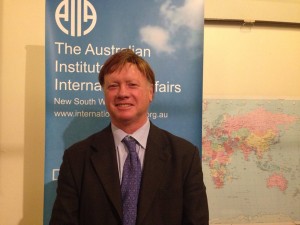Australia and the TPP: burden or advantage?
On 11 August, Professor Thomas Faunce from the ANU Colleges of Medicine and Law addressed AIIA NSW on Australia’s expected Trans Pacific Partnership obligations. In a rapid-fire delivery which traversed a good deal of complex technical material, Professor Faunce suggested that signing on would make Australian laws and legislatures unacceptably vulnerable to external legal challenge. He asserted that Trade Related Intellectual Property arrangements (TRIPS) were a scam cooked up by American-based multinationals to protect their shareholders with no regard for the interests of the people in whose countries they operated. United States companies were working behind closed doors in lock-step with Washington, allowing no opportunities for similar consultations between Australian companies and governments. The result would be that United States commercial laws would not change, but those of other countries thinking of joining the TPP, including Australia’s, would have to. The Pharmaceutical Benefits Scheme negotiated by former Labor Prime Minister Ben Chifley with the overwhelming democratic support of Australian voters was in danger of complete dismantlement. With the interests of their shareholders solely in mind, United States pharmaceutical companies wanted to extend patent rights to their products from five to twelve years, and were biased in favour of producing drugs that needed taking for many years instead of those needed to cure ailments in short time. Trade arbitrators selected in the United States to monitor and enforce TPP provisions need not be trained in the law, and would be paid by the hour basically to judge disputes, to protect US law and never to find against US firms. The Australian rule of law and Australian courts would be marginalised in the process. Under such circumstances and with such anticipated outcomes, why were other countries in the Pacific Basin negotiating to join the TPP? What were the attractions? Essentially because they could see benefits in gaining access to US markets for their products denied them if they did not join. In Japan’s case, it was for better access for its manufactures in American markets. In Australia’s case it was for commodities such as sugar.
But according to Professor Faunce, a complex game of chess was being played to confound the public. The Australian Trade Minister Andrew Robb was suggesting that the TPP might not eventuate because countries were not getting what they wanted. But in Faunce’s view, this was a smoke-screen. A deal had already been struck, and Robb would eventually announce that Australian trade interests were protected. Both Robb and Australian trade officials meanwhile were remaining singularly opaque about detailed negotiations.
For further elaboration of Professor Faunce’s views, the reader is advised to listen to a podcast interview conducted by one of AIIA NSW’s interns immediately before his address at Glover Cottages.
Report written by Richard Broinowski
